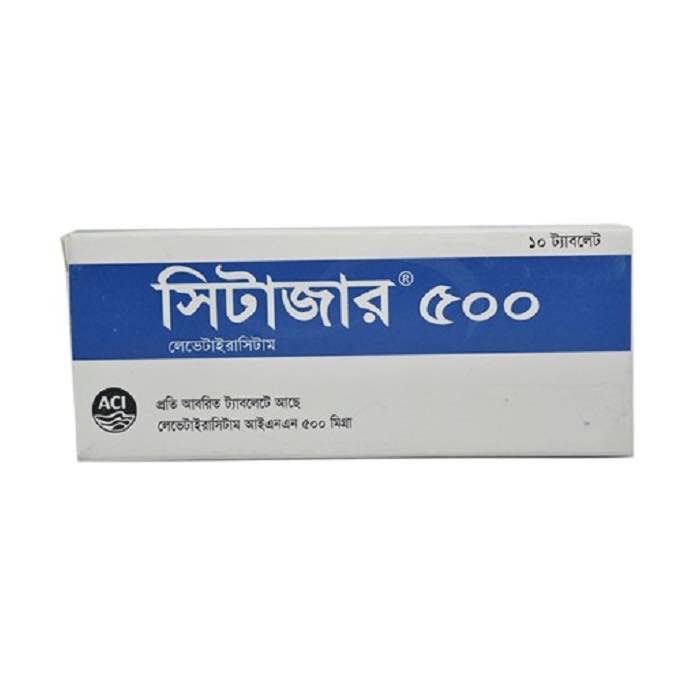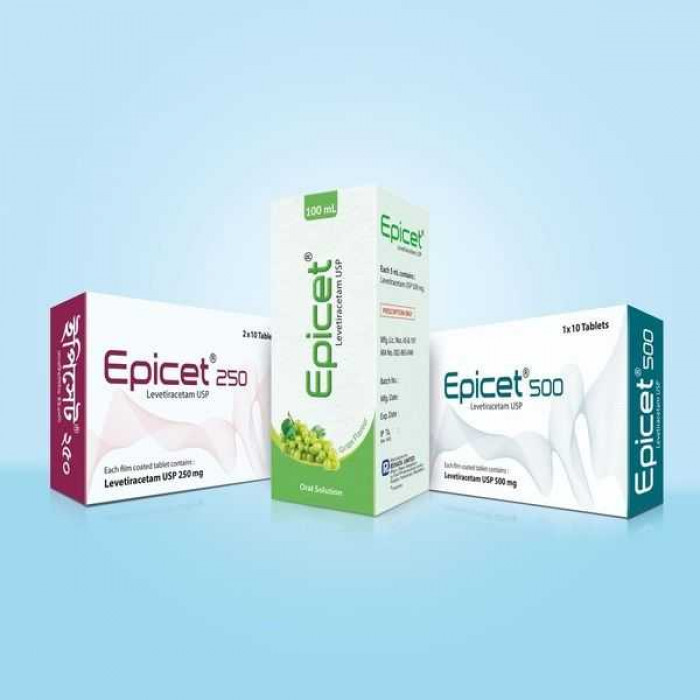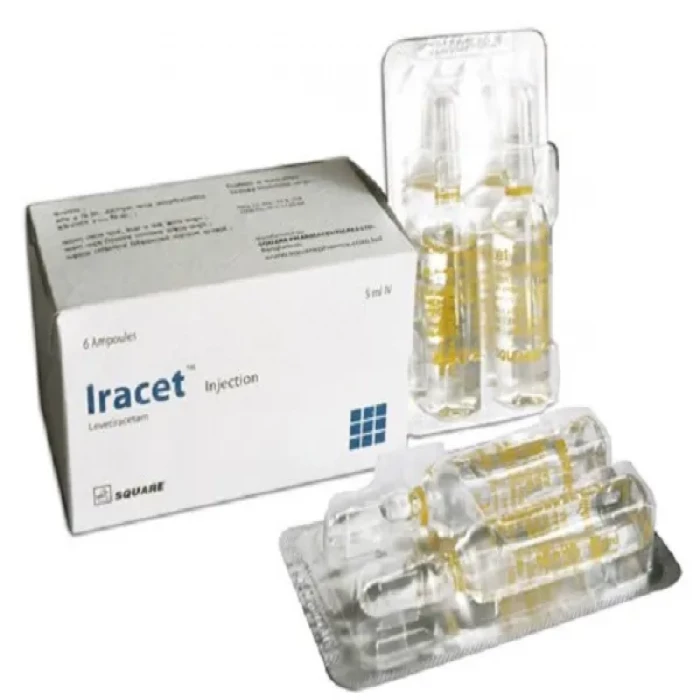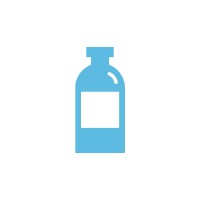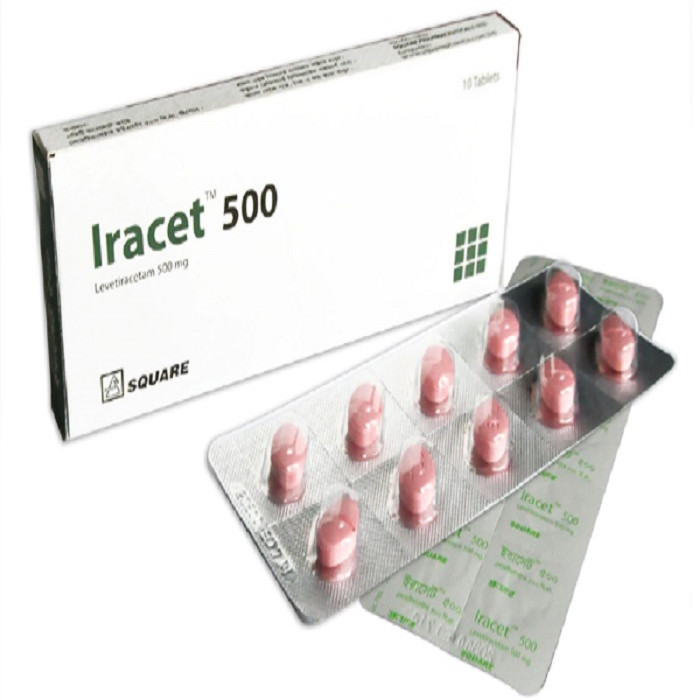
✔ 100% Authentic Product
👁️ Currently Viewing 2705
Iracet 500mg 10pcs
Tablet Manufacturer/Distributor: Square Pharmaceuticals Ltd. Generic Name: Levetiracetam 500mg Tablet
Discount
Price: ৳ 303
MRP:
৳
319
5%
Off

100% Genuine Products, Guaranteed

Safe & Secure Payments, Always

Fast, Secure & Efficient Delivery

Proper Packaging
 Cash on Delivery - All over Bangladesh
Cash on Delivery - All over Bangladesh Regular Delivery - 12-24 Hours, Dhaka City* Charge Tk.39-59
Regular Delivery - 12-24 Hours, Dhaka City* Charge Tk.39-59 Regular Delivery - 24-48 Hours, Other Cities* Charge Tk.99-110
Regular Delivery - 24-48 Hours, Other Cities* Charge Tk.99-110
🌙 রমযান অফার 🌙
 ফ্রি ডেলিভারিঃ - ৭৯৯ টাকা+ অর্ডারে, ঢাকা
শহরে
ফ্রি ডেলিভারিঃ - ৭৯৯ টাকা+ অর্ডারে, ঢাকা
শহরে ফ্রি ডেলিভারিঃ - ২৭৯৯ টাকা+ অর্ডারে, ঢাকার
বাহিরে
ফ্রি ডেলিভারিঃ - ২৭৯৯ টাকা+ অর্ডারে, ঢাকার
বাহিরে
📲 মোবাইল অ্যাপ অর্ডারে সাশ্রয় বেশী
-
Google Play Store থেকে ডাউনলোড
-
Apple Store থেকে ডাউনলোড
100% Genuine Products, Guaranteed
Safe & Secure Payments, Always
Fast, Secure & Efficient Delivery
Proper Packaging
 Cash on Delivery - All over Bangladesh
Cash on Delivery - All over Bangladesh Regular Delivery - 12-24 Hours, Dhaka City* Charge Tk.39-59
Regular Delivery - 12-24 Hours, Dhaka City* Charge Tk.39-59 Regular Delivery - 24-48 Hours, Other Cities* Charge Tk.99-110
Regular Delivery - 24-48 Hours, Other Cities* Charge Tk.99-110 ফ্রি ডেলিভারিঃ - ৭৯৯ টাকা+ অর্ডারে, ঢাকা
শহরে
ফ্রি ডেলিভারিঃ - ৭৯৯ টাকা+ অর্ডারে, ঢাকা
শহরে ফ্রি ডেলিভারিঃ - ২৭৯৯ টাকা+ অর্ডারে, ঢাকার
বাহিরে
ফ্রি ডেলিভারিঃ - ২৭৯৯ টাকা+ অর্ডারে, ঢাকার
বাহিরে- Google Play Store থেকে ডাউনলোড
- Apple Store থেকে ডাউনলোড
🌙 রমযান অফার 🌙
📲 মোবাইল অ্যাপ অর্ডারে সাশ্রয় বেশী
✅ Description:
Indications
Adults and adolescents from the age of 16 with newly diagnosed epilepsy should take levetiracetam as a monotherapy for partial-onset seizures with or without subsequent generalization. Levetiracetam is used as a supplement to other medications.
In adults, adolescents, children, and babies with epilepsy from 1 month of age, in the treatment of partial-onset seizures with or without subsequent generalization.
in the treatment of myoclonic seizures in adults and adolescents with Juvenile Myoclonic Epilepsy starting at the age of 12.
in the treatment of primary generalized tonic-clonic seizures in adults and adolescents with idiopathic generalised epilepsy starting at the age of 12 years.
Pharmacology
The sact mahanism of action is unknom but does not involve inhibitory and qcitatory neurotransmission' Stersselective binding of LevetiEcetam was confined to symPtic plasma membnnes in the central neryous system with no binding trcuring in PeriPheml tissue.
Dosage
Adults and adolescents from 16 years of age: The recommended starting dose is 250 mg twice daily which should be increased to an initial therapeutic dose of 500 mg twice daily after two weeks. The dose can be further increased by 250 mg twice daily every two weeks depending upon the clinical response. The maximum dose is 1500 mg twice daily.
Adults (≥18 years) and adolescents (12 to 17 years) weighing 50 kg or more: The initial therapeutic dose is 500 mg twice daily. This dose can be started on the first day of treatment. Depending upon the clinical response and tolerability, the daily dose can be increased up to 1,500 mg twice daily. Dose changes can be made in 500 mg twice daily increases or decrease every two to four weeks.
Pediatric population: The tablet formulation is not adapted for use in infants and children under the age of 6 years. Oral solution is the preferred formulation for use in this population. In addition, the available dose strengths of the tablets are not appropriate for initial treatment in children weighing less than 25 kg, for patients unable to swallow tablets or for the administration of doses below 250 mg. In all of the above cases, oral solution should be used.
Monotherapy: The safety and efficacy of levetiracetam in children and adolescents below 16 years as monotherapy treatment have not been established.
Add-on therapy: Oral solution is the preferred formulation for use in infants and children under the age of 6 years. For children 6 years and above, oral solution should be used for doses under 250 mg, for doses not in multiples of 250 mg when dosing recommendation is not achievable by taking multiple tablets and for patients unable to swallow tablets. The lowest effective dose should be used. The starting dose for a child or adolescent of 25 kg should be 250 mg twice daily with a maximum dose of 750 mg twice daily. Dosing for children 50 kg or greater is the same as in adults.
Add-on therapy: For infants aged from 1 month to less than 6 months: The oral solution is the formulation to use in infants.
Administration
The film-coated pills must be taken orally, with or without meals, and must be eaten with a sufficient amount of fluids. The daily dosage is divided into two equal halves and given twice a day.
Interaction
Pre-marketing data from adult clinical studies show that levetiracetam had no effect on the serum concentrations of existing antiepileptic medicinal products (phenytoin, carbamazepine, valproic acid, phenobarbital, lamotrigine, gabapentin, and primidone), and that these antiepileptic medicinal products had no effect on the pharmacokinetics of lev.
Probenecid, a renal tubular secretion inhibiting drug, has been found to decrease renal clearance of the main metabolite but not of levetiracetam (500 mg four times day). Nonetheless, this metabolite's concentration remains modest.
Methotrexate: It has been reported that taking levetiracetam and methotrexate together reduces methotrexate clearance, resulting in higher/longer blood methotrexate concentrations that are potentially hazardous. The levels of methotrexate and levetiracetam in the blood should be closely monitored in patients who are taking both medicines at the same time.
When the osmotic laxative macrogol is taken concurrently with oral levetiracetam, there have been rare instances of reduced levetiracetam effectiveness. As a result, one hour before and one hour after taking levetiracetam, macrogol should not be taken orally.
Food and alcohol had no effect on the amount of levetiracetam absorption, although the pace of absorption was somewhat slowed. There is no information on how levetiracetam interacts with alcohol.
Contraindications
Hypersensitivity to the active ingredient or other pyrrolidone derivatives, as well as any excipients.
Side Effects
The following are the most frequent adverse events (incidence 5% higher than placebo):
Somnolence, asthenia, illness, and dizziness in adults
Fatigue, aggressiveness, nasal congestion, reduced appetite, and irritability are common in children.
Pregnancy & Lactation
Levetiracetam should not be used during pregnancy or by women of reproductive potential who are not taking contraception unless it is clinically required. Human breast milk contains levetiracetam. As a result, nursing is not advised. If levetiracetam therapy is required during nursing, the drug's value and risk should be balanced against the significance of breastfeeding. In animal trials, there was no effect on fertility. There are no clinical data available, and the danger to humans is unclear.
Precautions & Warnings
Renal impairment: Patients with renal impairment may require dosage adjustments when using levetiracetam. Assessment of renal function is indicated before dosage selection in individuals with significantly compromised hepatic function.
Acute renal injury: Levetiracetam usage has been linked to a very small number of cases of acute kidney injury, with start times ranging from a few days to many months.
Blood cell counts: Levetiracetam administration has been linked to rare occurrences of reduced blood cell counts (neutropenia, agranulocytosis, leucopenia, thrombocytopenia, and pancytopenia), usually at the start of treatment. In patients with significant weakness, pyrexia, recurring infections, or coagulation problems, complete blood cell counts are recommended.
Suicide, suicide attempts, and suicidal ideation and behavior have all been recorded in anti-epileptic drug patients (including levetiracetam). A meta-analysis of anti-epileptic drug randomized placebo-controlled studies found a modest increase in the incidence of suicide thoughts and behavior. The mechanism behind this risk is unknown. As a result, patients should be closely watched for symptoms of depression and/or suicidal ideas and behavior, with appropriate therapy explored. Patients (and their carers) should be encouraged to seek medical help if they show indications of sadness or suicidal thinking or behavior.
Infants and children under the age of six years are not suitable for usage with the tablet formulation. There was no evidence of an effect on development and puberty in children based on the available data. Long-term consequences on children's learning, intellect, development, endocrine function, puberty, and reproductive capacity are unclear.
Storage Conditions
Store in a cool (not exceeding 25°C) and dry location away from direct sunlight.
⚠️Disclaimer:
At ePharma, we’re committed to providing accurate and accessible health information. However, all content is intended for informational purposes only and should not replace medical advice from a qualified physician. Please consult your healthcare provider for personalized guidance. We aim to support, not substitute, the doctor-patient relationship.




